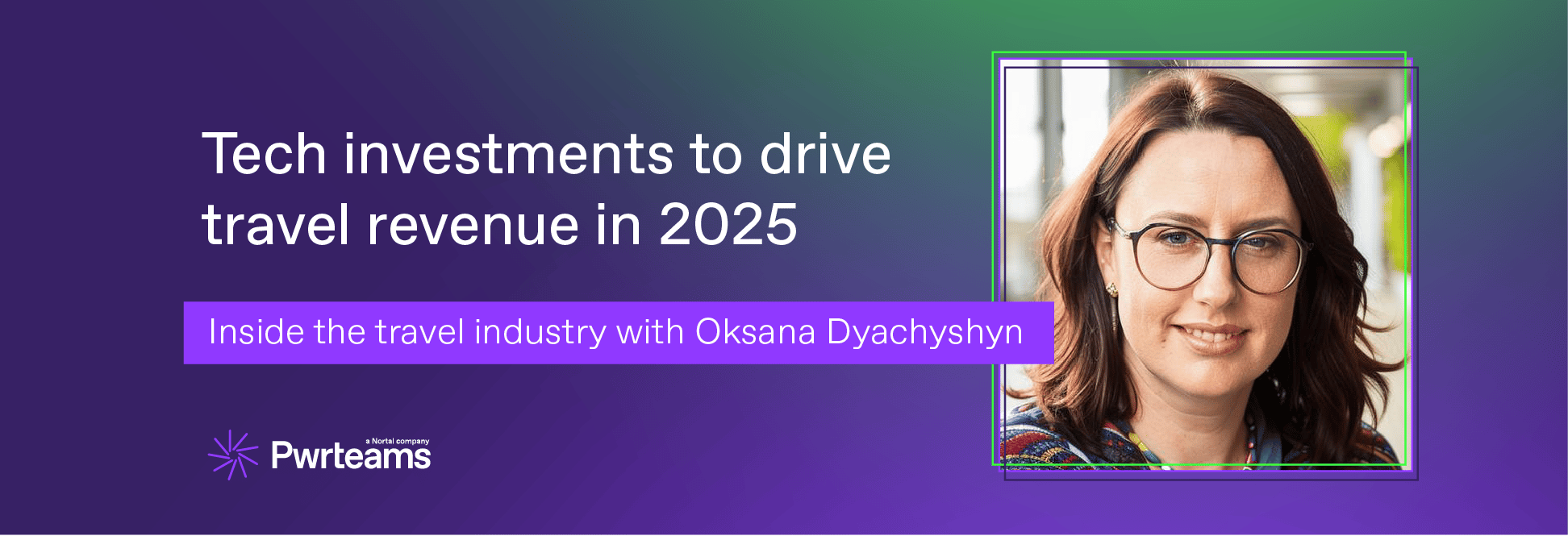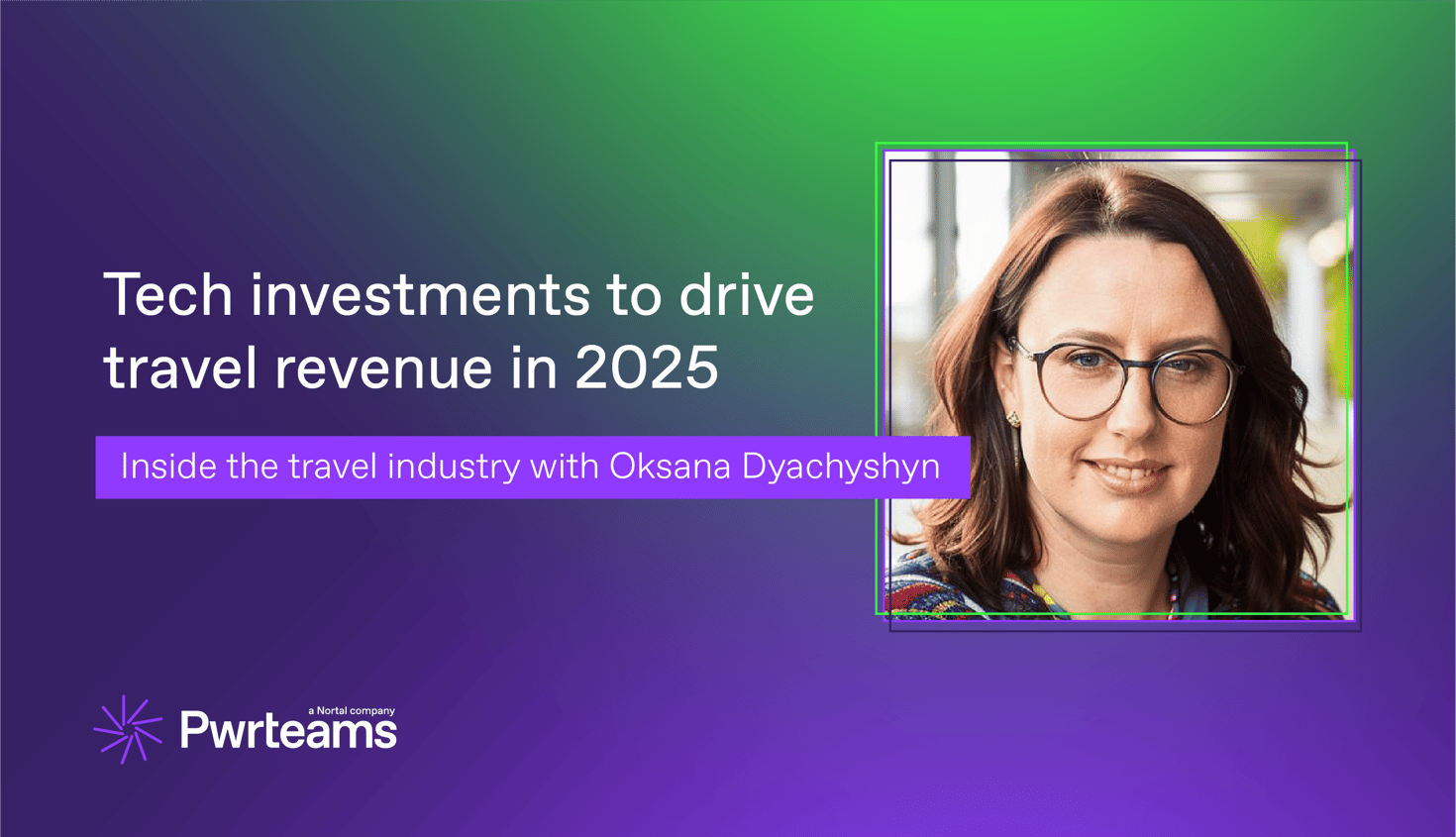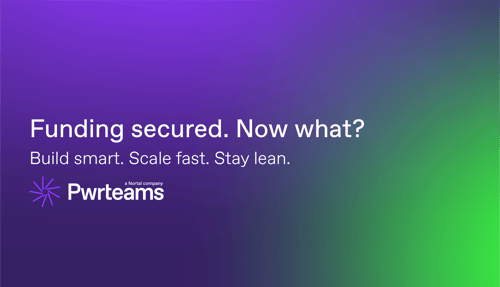How CIOs can leverage tech to transform the travel industry in 2025


Where does the travel industry stand as 2024 comes to a close? The answer isn’t simple - but that’s not a bad thing. While the landscape constantly shifts, key players prioritise agility and long-term strategies to meet and predict evolving market needs. One thing remains clear: technology investments are unwavering, acting as the guiding force in navigating through market changes.
Some sources claim the global travel industry is witnessing a rebirth, expected to ‘grow faster than the worldwide economy' over the next four years. Meanwhile, travel companies and global hotel chains are feeling a slowdown – for them, the outlook isn’t so bright.
Still, IT spending in travel is going strong. Last year, 91% of travel companies surveyed by Amadeus expected ‘moderate to aggressive’ increases in technology investment in their organisations in 2024. So, how do you manage rising costs without overblowing your budget? And which tech should you choose to match evolving customer travel needs and habits? We’ve got some clues for you.
Tech strategies for optimised travel operations
Across the industry, travel companies are investing in tech to delight customers and improve results. Just look at Shannon Airport. They recently launched a mobile app featuring augmented reality and smartwatch integration for real-time departure updates and at-home bag size checking. Another example comes from Gatwick Airport, which uses real-time analytics to streamline passenger flow, reducing the security check time to under 5 minutes. Similarly, one of our clients increased their trip bookings from 5% to 19% by enhancing their mobile app and simplifying online flight and hotel check-ins.
These and other cases prove that investing in travel tech can be transformative when done the right way. The first step to embark on this transformation is identifying the best areas for tech investment and growth. We’re coming up with some suggestions and explaining how dedicated teams can help materialise them.
Modernising legacy systems
In travel, staying competitive requires evolving beyond outdated systems. By migrating to modern platforms and integrating third-party systems, features, and apps, you can unlock a new level of performance and optimisation and set your operations up for future scalability. System modernisation boosts efficiency, reduces costs, and delivers faster, more reliable services aligned with customer expectations. However, many travel companies keep postponing the decision to upgrade their core systems because they need more resources. Augmented teams can be of crucial importance here.
Consider our client, a global travel group in need of overhauling their booking system. They required a solution that would process scores of information like room availability, facility information, weather forecasts, high-res images, and others in real-time. This task, while essential to improving business performance, was challenging. It involved migrating large volumes of data and developing APIs in a high-demand, complex, live environment.
To complete it, the company enlisted our dedicated experts. Integrated into their teams, they created a new API system that introduced key automations, optimised data monitoring and reporting, and streamlined aggregation and exchange of information between the core platform and third-party apps. This move has made gathering, updating, merging, and sending travel information much easier and more efficient, all while maintaining data integrity and minimising downtime.
Bring your travel operations up to speed by modernising your legacy systems. Assemble your perfect team of full-stack developers, web and mobile engineers, cloud specialists, data engineers, DevOps professionals, automation and integration experts, and other professionals who will assist you in seamlessly transitioning to next-generation technology.
Adopting NDC (New Distribution Capability) standard by airlines
New Distribution Capability is a data exchange format built for airlines to offer richer content, such as personalised fares and ancillaries, and access and sell airline products more dynamically, reaching more customers. To illustrate this, American Airlines' strategy to reserve 40% of their lowest-fare tickets exclusively via NDC has propelled them to achieve 80% of all bookings made online. Similarly, travel giants like TUI, Booking.com, and Expedia gain more control over their products by offering tailored fares and providing a more unified experience across distribution channels.
But while the adoption of NDC is gradually increasing, and some major airlines have achieved considerable success in boosting online sales post-adoption, the overall uptake remains sluggish. Despite its many benefits, NDC is not yet an industry standard. In 2022, only 7% of travel agency employees were familiar with it, and even two years later, progress has been slow. For instance, United, the world’s most expanded airline, has seen steady growth in ticket sales through NDC channels, but these only represent 10% of all tickets sold as of 2024.
The challenging implementation is one reason only the biggest industry players are making the NDC move for now. The technical complexity requires major IT investments and the integration of NDC with existing systems and distribution channels, which can lead to operational disruptions. NDC relies on APIs for seamless communication. And while the XML format is standardised, its implementation can vary significantly between companies. The influx of real-time data streaming from multiple channels adds to this complexity.
Again, a dedicated team handling the technical aspects can be the best solution to resolve these issues and gain an edge with NDC implementation. Tech experts with relevant travel industry experience can manage the intricacy of NDC integrations, leveraging machine learning algorithms and predictive analytics tools to additionally enhance them and allow you to create more targeted offers and optimised, dynamic pricing strategies.
Developing native mobile applications
With 80% of travellers researching trips on their phones, no travel or hospitality company should miss out on offering a mobile app. Native apps designed specifically for iOS and Android platforms deliver superior performance, security, and responsiveness compared to web-based applications. They load faster, feel more intuitive, and offer a seamless experience that busy, always-on-the-go travellers will appreciate.
If you're questioning whether native apps are worth the investment, consider the results we’ve reached with another of our clients. To facilitate travel bookings for their users, they needed a functional, user-friendly and performant native mobile app. By augmenting their teams with our Swift and Kotlin experts, they developed a solution that integrates with payment gateways and allows structured browsing of over 1.5 million hotels and thousands of flights. The new app has brought tremendous results, increasing conversion rates by 30% and boosting long-term customer satisfaction.
Which mobile app trends to invest in?
Mobile trends come and go. Some of them have been with us for a while, but if your apps still don’t take advantage of them, it’s high time you changed it.
Take AR, for instance. By no means is it the latest trend. Still, when applied creatively, it can completely overhaul the traveller experience and improve your users’ convenience and loyalty. Moxy Hotels used AR to bring a playful element to their guest experience. They launched a game, "Moxy Universe, Play Beyond," which brings players into an interactive world, allows them to customise avatars and grants prizes for exploring the hotel.
Biometric authentication is also hardly a novelty, but it should be a non-negotiable for some travel products. By now, 40% of airports have already implemented biometrics at some service points, with another 50% planning to roll it out soon. And it’s not only airports that tap into its powers. Hotels make elaborate use of the tech, implementing biometricsfor foolproof check-in and loyalty points aggregation and payments. Self-bag drop, access to VIP lounges, and ticket purchases… these are other examples of how biometric authentication can improve travel and make it more profitable for providers, too.
Deliver a native mobile experience that travellers will love. Build your ideal team of iOS Developers, Android Developers, Swift Developers, Kotlin Developers, and QA Engineers.
Growing the scope and depth of data analytics scenarios
Data analytics is crucial for travel companies, driving revenue growth and operational efficiency. And while you’re probably using it already to some extent, it might be the perfect time to double down on that investment. Why? The evolution of data analytics is ongoing, and over the next year, 44% of travel agencies plan to put more money into analytics alongside machine learning and generative AI. You don’t want to drag behind.
Just look at what’s happening across the industry. Marriott International and other leading hotel chains use AI-driven personalisation in their loyalty programmes, creating tailored offers based on past customer behaviour to boost engagement. Similarly, Eindhoven Airport uses real-time data analytics to reduce aircraft turnaround times, analysing video feeds to predict and prevent delays. Already, 48% of airports and airlines use predictive analytics to anticipate disruptions, helping them avoid costly inefficiencies with on-time warnings and alerts. Just imagine how this level of insight could enhance your operations!
By expanding your data analytics capabilities, you can forecast demand more accurately, personalise services to increase customer loyalty and adjust pricing dynamically to stay competitive. One example you can follow is this German travel group. Huge as they are, they needed more people with niche skills to redesign their critical systems and improve data processing capabilities. They integrated a dedicated team of software architects and developers to build a new system to automatically import, parse, compare, and process data about flight seats and pricing.
Based on microservices architecture for easy scaling and upgrades, the new platform optimised and modernised three key areas of the company’s operation: flight seat management, flight pricing module, and invoice verification. On top of improving operational efficiency by automating and streamlining tasks, the new system decreased their travel management sales operations costs by 7%.
Including smart contracts and blockchain for payments
As younger generations become a driving force in the market, they are also leading the way in adopting cryptocurrencies and alternative payment methods. 19% of Gen Z and 24% of Millenials in European countries like Austria, France, Germany, Italy, and Switzerland own crypto. Countries like Japan, Germany, and the U.S. increasingly accept Bitcoin and other digital currencies as a legal payment method for various goods and services.
From a travel business perspective, embracing blockchain and smart contracts can revolutionise how you handle transactions and help you tap into a bigger customer base. Leading airlines like airBaltic have accepted Bitcoin since 2014, while luxury hotel chains like The Kessler Collection and Pavilion Hotels & Resorts now allow travellers to pay with cryptocurrencies.
But it’s not just about payments. Blockchain also powers smart contracts, which can automate and secure many processes. Picture this: a traveller books a hotel using cryptocurrency, and a smart contract automatically processes the payment once the booking is confirmed, reducing the risk of fraud. Smart contracts can also streamline repetitive tasks like booking confirmations, loyalty point redemptions, and refunds, freeing up your team’s time and boosting operational efficiency.
Blockchain challenges you’ll need to address
While the benefits are clear, blockchain implementation is far from frictionless. The infrastructure must be robust enough to handle high transaction volumes, especially during peak travel seasons. You have to ensure the system performs efficiently while processing numerous transactions simultaneously.
Regulatory compliance is another significant hurdle. While you might be free to implement blockchain in the U.S. and most European countries, other destinations will require a double-check on local and international regulations. For instance, China banned all cryptocurrency transactions, while Mexico implemented partial restrictions.
To truly harness the power of blockchain, you’ll need a team that’s both skilled and adaptable experts in blockchain protocols, cryptography, and smart contract development using technologies like Solidity, JavaScript, Python, and Go. Together with specialists in regulatory compliance, they will ensure your blockchain strategy aligns with global standards, local laws, and your customer needs.
Expand your reach with blockchain-powered payments and secure transactions. Build your ideal team of Blockchain Developers, Smart Contract Engineers, Software Developers, Security Architects, and Data Analysts.
Invest in tech talent that pays off
In these uncertain times for the travel industry, one truth stands out: people will always travel, no matter how their habits or preferences change. Even if spending patterns shift or new formats come into play, the desire to explore remains strong. Your job is to embrace it by offering better, more tailored services while keeping costs in check.
Investing in the right tech talent can make this task easier. Whether modernising outdated systems, adopting new distribution models, or applying advanced data analytics, a dedicated, skilled team by your side will ensure you stay ahead without stretching your budget. We can assist you, providing the expertise and support you need to navigate changes in travel and come out on top. Join us and take the next step – together.
 August 5, 2025
August 5, 2025
Inside an Azure-based OWASP ZAP implementation
Read the post July 22, 2025
July 22, 2025
Scaling fintech in Benelux & Nordics – avoiding post-funding pitfalls
Read the post May 13, 2025
May 13, 2025
Close your round, scale your roadmap: how nearshore tech teams accelerate UK fintech growth
Read the postWrite your own
success story
with Pwrteams!
Share your details in the form, tell us about your needs, and we'll get back with the next steps.
- Build a stable team with a 95.7% retention rate.
- Boost project agility and scalability with quality intact.
- Forget lock-ins, exit fees, or volume commitments.